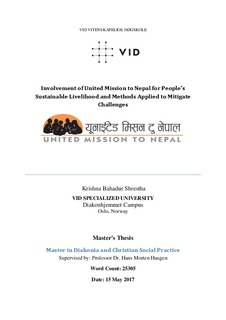Involvement of United Mission to Nepal for People’s Sustainable Livelihood and Methods Applied to Mitigate Challenges Krishna
Master thesis
Permanent lenke
http://hdl.handle.net/11250/2452344Utgivelsesdato
2017Metadata
Vis full innførselSamlinger
Sammendrag
Livelihood is the primary and the most significant human need and is the burning issue in the global south. Livelihood is both, the factor of poverty and the means to cope with it. However what kind of livelihood and how it considers the socio-cultural, economic and ecological aspects that directly involve with in it, determines whether the livelihood is sustainable or not. Sustainable livelihood approach is widely used approach to eliminate poverty that also interrelates and contributes achieving sustainable development and millennium development goals. Nepal as, one of the least development countries in global south is struggling against poverty. Sustainable livelihood approach is primarily applied to cope with poverty in the rural parts of the country for which international communities and development agencies have been working with the state and national governmental organizations.
Among such organizations, United Mission to Nepal (UMN), a Christian faith based organization and recognized as an INGO by Nepal government, has been working in the overall needy areas in the country since its establishment in Nepal in 1954. Sustainable livelihood is one of the areas, UMN working, in order to support people living in extreme poverty. Being a Christian faith based organization working in a Hindu dominant country more than six decades, with the multi-lingual, multi-cultural, multi-religious societies, is a motivating fact of UMN to explore its diaconal works. Hence, the researcher has carried out the research to explore how UMN is promoting people's sustainable livelihood in Nepal. This research is designed applying the qualitative approach and the data are collected using qualitative research tools. The major findings are, UMN is promoting sustainable livelihood by supporting in the livelihood strategies and in livelihood assets as well as building capabilities of people. Nevertheless, the sustainability of the livelihood is not ensured due to the lack of livelihood assets, chaotic political and institutional situation and the high vulnerability context, for which UMN should furthermore strengthen its advocacy works and collaboration with the authorities to influence from policy level.
